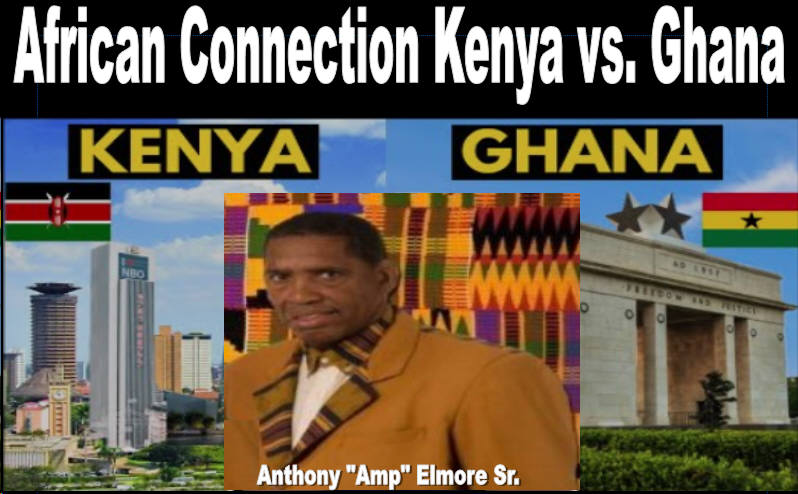
In the above image Anthony "Amp" Elmore sports a custom suit he has made in Ghana. The suit is laced with Kente cloth that is made in Ghana. In the background is Kente that means "Basketweave." Elmore had an entire wardrobe made in Ghana including furnishing his 5000 square foot home in Memphis, Tennessee. Elmore found mudcloth made in Mali in Ghana.
Anthony "Amp" Elmore's deep ties to both Kenya and Ghana highlight the unique aspects of each country in the context of hosting the "First Black Family Reunion in Africa." Unlike Kenya, Ghana has established programs to attract African Americans, including offering dual citizenship and numerous opportunities for African Americans who have traveled and even settled there. Kenya, on the other hand, lacks targeted marketing towards African Americans and does not have any dedicated African American tours.
In 2019, Ghana celebrated "The Year of Return," commemorating 400 years since the first Africans were forcibly taken from their homeland and sold into slavery. This event marked a significant effort to reconnect the African diaspora with their roots. When it comes to Black culture, Ghana is deeply rooted in traditional practices and celebrations. For those interested in garment making, Ghana offers some of the best choices with readily available tailoring services throughout the country. In contrast, Ghana is known for its intricate embroidery, which is easily accessible.
While Ghana excels in preserving traditional African culture and practices, Kenya stands out as a cosmopolitan hub. Nairobi, Kenya’s capital, is a bustling international city with a robust tourist infrastructure, offering a wide range of entertainment options. Nairobi boasts luxurious five-star hotels, vibrant restaurants, casinos, and clubs, providing a dynamic nightlife and cultural scene. The city's international ambiance makes it comparable to major global cities like New York and Los Angeles, offering an unparalleled experience for Black Americans seeking a blend of modernity and tradition. Kenya’s expansive wildlife reserves also make it a unique destination, offering unparalleled opportunities for safari experiences that are unmatched anywhere else in the world.
In essence, the first Black Family Reunion in Kenya offers a glimpse into 21st-century Africa, blending traditional cultural richness with modern, international entertainment. This event not only provides a connection to heritage but also showcases the diverse and vibrant present-day culture of Kenya, making it a significant choice for such a historic gathering.
In October 1964, a significant meeting took place at the New Stanley Hotel in Kenya, where Black Nationalist leader Malcolm X met Civil Rights leader John Lewis. Malcolm X pledged his support for the civil rights movement and later traveled to Alabama to support Dr. Martin Luther King Jr. Although he was not allowed to meet Dr. King, he had the opportunity to speak with Coretta Scott King. Tragically, two weeks after this encounter, Malcolm X was assassinated.
Tom Mboya's connection to the American civil rights movement is also notable. In April 1959, he spoke at a rally organized by Dr. King. These historical interactions highlight the deep and often overlooked ties between Kenya and America, revealing a rich tapestry of shared struggles and aspirations. These stories underscore the significance of Kenya in the broader narrative of African American history and civil rights.